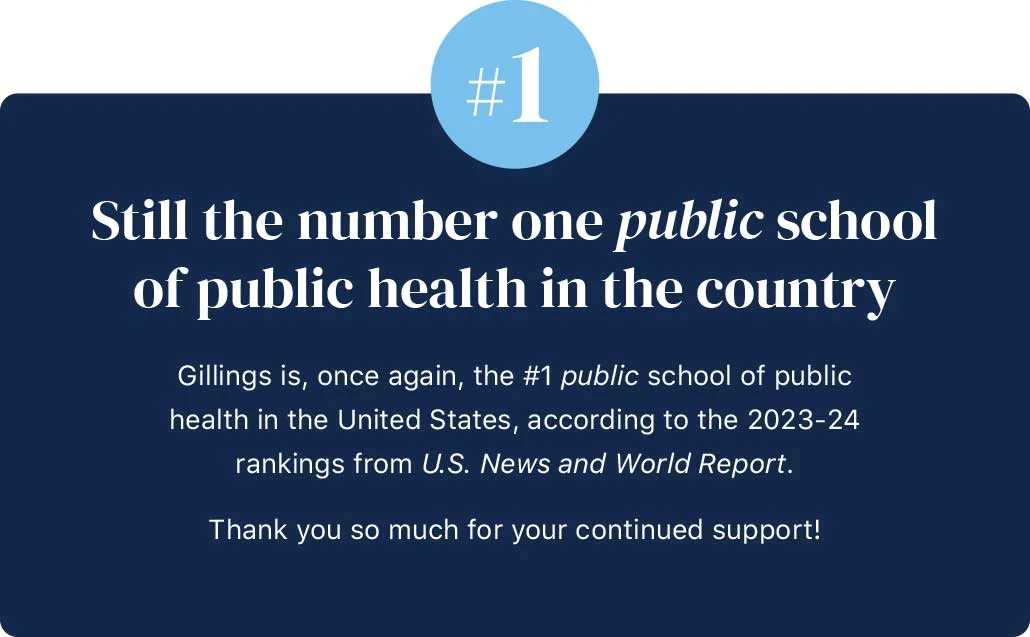Exploring Gillings' impactful contributions to reducing tobacco sales to minors, featuring Dr. Kurt Ribisl's research and policy advocacy against Juul Labs.
Juul Labs has made front-page news the past few years, as it has reached settlements with more than 40 states, plus a number of local governments and individuals over its marketing of tobacco products to minors. At this time, Juul Labs has agreed to pay almost $3 billion in settlements.
This is the culmination of years of research and advocacy on the part of policy and public health experts, including a team of UNC-Chapel Hill researchers.
Kurt Ribisl, PhD, the Jo Anne Earp Distinguished Professor and chair of the Gillings School’s Department of Health Behavior, has been a driving force in this research.
Ribisl began researching tobacco control in the mid-1990s. Over the years, his research portfolio has focused on illegal tobacco sales to minors and the sales and marketing of tobacco products at stores.
When North Carolina became the first state to bring a lawsuit against Juul Labs for marketing its e-cigarettes to minors, Ribisl served as an expert witness in the case. He produced an expert report about Juul Labs’ marketing and sales practices and their lack of age verification.
"Policy is the most powerful lever we can pull to reduce tobacco use. The greatest successes we’ve had have come through policy changes to increase taxes on tobacco products, reduce exposure to secondhand smoke through clean indoor air laws, and restrict marketing practices and flavor usage.
Ribisl read more than 15,000 Juul Labs documents to compile the report, including internal emails, reports to investors and discussions among the company’s founders. These documents revealed staggering evidence against Juul Labs and led to the company settling with the state before the case went to trial.
As a part of the settlement, N.C. Attorney General Josh Stein negotiated to require Juul Labs to publicly disclose their internal emails, reports to investors and strategy documents. To date, one million documents have been added to an online depository co-managed by UNC-Chapel Hill’s University Libraries and the University of California, San Francisco, with more documents being added regularly. Anyone can now search the depository and learn how the company targeted youth. This visibility into Juul Labs’ tactics will help ensure that other companies cannot use the same playbook.
Among the documented issues was the fact that Juul Labs actively engaged in social media marketing despite knowing a large portion of their social media followers were underage. The company worked with influencers and celebrities, some of whom were underage, who were popular among youth. Juul Labs had also studied which flavors appeal to youth, and many of those flavors, including Fruit Medley, Mango and Mint, were used in their vape products. Similarly, they took steps to make their products more appealing to minors by offering them in the same popular colors that were available for iPhones.
The report also demonstrated that when the company became aware of stores selling Juul products to minors, it did little to prevent these sales. Even when stores were repeatedly found to sell to kids, Juul Labs didn’t significantly punish them or cut off the supply of JUUL devices or refillable pods.
Policies that regulate tobacco marketing and sales practices and the enforcement of these policies are crucially important to reduce tobacco use and the associated health risks among minors.
“Policy is the most powerful lever we can pull to reduce tobacco use,” said Ribisl, who is also the program leader for Cancer Prevention and Control at the UNC Lineberger Comprehensive Cancer Center. “The greatest successes we’ve had have come through policy changes to increase taxes on tobacco products, reduce exposure to secondhand smoke through clean indoor air laws, and restrict marketing practices and flavor usage.”
Policy change doesn’t happen quickly or easily, though. A large team of Carolina researchers has worked tirelessly to collect evidence that reinforces the need for tighter tobacco regulations. The team includes:
- Noel Brewer, PhD, the Gillings Distinguished Professor in Public Health and professor in the Department of Health Behavior, researches the effects of warning labels on vapes and other tobacco products.
- Shelley Golden, PhD, associate professor in the Department of Health Behavior, leads work on how public policies and neighborhood characteristics influence individual health behaviors and how changing retail market conditions affect tobacco use. She also studies the impact of taxes and prices on tobacco use.
- Sarah Mills, PhD, assistant professor in the Department of Health Behavior, has conducted in-depth research on the impact of menthol bans and the disproportionate amount of advertising for menthol cigarettes in Black communities.
- Seth Noar, PhD, the Howard & McLean Parker Distinguished Professor in the UNC Hussman School of Journalism and Media, is focused on cancer prevention via tobacco control health communications.
Despite making significant strides over the past few decades, tobacco-related health issues remain a major public health concern. Gillings School researchers continue to investigate the most effective tobacco control strategies and remain committed to partnering with policymakers to curb tobacco use and save lives.




